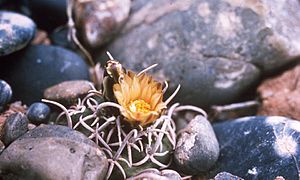Navajo pincushion cactus facts for kids
Quick facts for kids Navajo pincushion cactus |
|
|---|---|
 |
|
| Conservation status | |
| Scientific classification | |
| Kingdom: | |
| (unranked): | |
| (unranked): | |
| (unranked): | |
| Order: | |
| Family: | |
| Genus: | |
| Species: |
P. peeblesianus
|
| Binomial name | |
| Pediocactus peeblesianus (Croizat) L.D.Benson
|
|
| Synonyms | |
|
Navajoa peeblesiana |
|
The Pediocactus peeblesianus is a very rare type of cactus. People often call it the Navajo pincushion cactus. This special plant only grows in Arizona, a state in the United States. One kind of this cactus is even listed as an endangered species, meaning it's in danger of disappearing forever.
Contents
What it Looks Like
This small cactus is usually shaped like a ball or an egg. It can grow up to about 6.5 centimeters (2.5 inches) tall and 5.5 centimeters (2 inches) wide. Its color is a grayish-green.
Sometimes, you might only see the top part of the cactus sticking out of the ground. When the weather is very dry, the whole cactus can shrink and hide completely under the soil!
Spines and Flowers
The cactus has small, circular, hairy spots called areoles on its surface. Each areole has a few spines. The longest spines can be more than 2 centimeters (0.8 inches) long. These spines are mostly soft and bendy, like cork, but they have hard tips. They are usually white or a dull color.
When it blooms, the cactus produces yellowish flowers. These flowers can open up to 2.5 centimeters (1 inch) wide. After the flower, a fruit grows. It starts green and turns reddish when it's ripe. The fruit is about 1 centimeter (0.4 inches) long.
Where it Lives
The Navajo pincushion cactus grows in desert areas. It also lives where the desert meets Great Basin grasslands. You can find it growing in sandy soil and among rocks.
This cactus species is divided into two main types, called subspecies. Sometimes, these are also called varieties.
The rarer type is called ssp. peeblesianus, or the Peebles Navajo cactus. This type is very rare and endangered. It only grows in a small strip of desert in Navajo County, Arizona. This area is close to the towns of Joseph City and Holbrook.
Challenges it Faces
In recent years, long periods of dry weather have been a big problem for this cactus. Drought means there isn't enough rain, which makes it hard for the cactus to survive.
The Peebles Navajo cactus also has a special connection with tiny living things called fungi. This connection is called a mycorrhizal association. It means the cactus and fungi help each other to grow. Some of these helpful fungi include Glomus deserticola.
How it Got its Name
The Pediocactus peeblesianus was named after a botanist from Arizona. A botanist is a scientist who studies plants. His name was Robert Hibbs Peebles.
See also
 In Spanish: Pediocactus peeblesianus para niños
In Spanish: Pediocactus peeblesianus para niños


